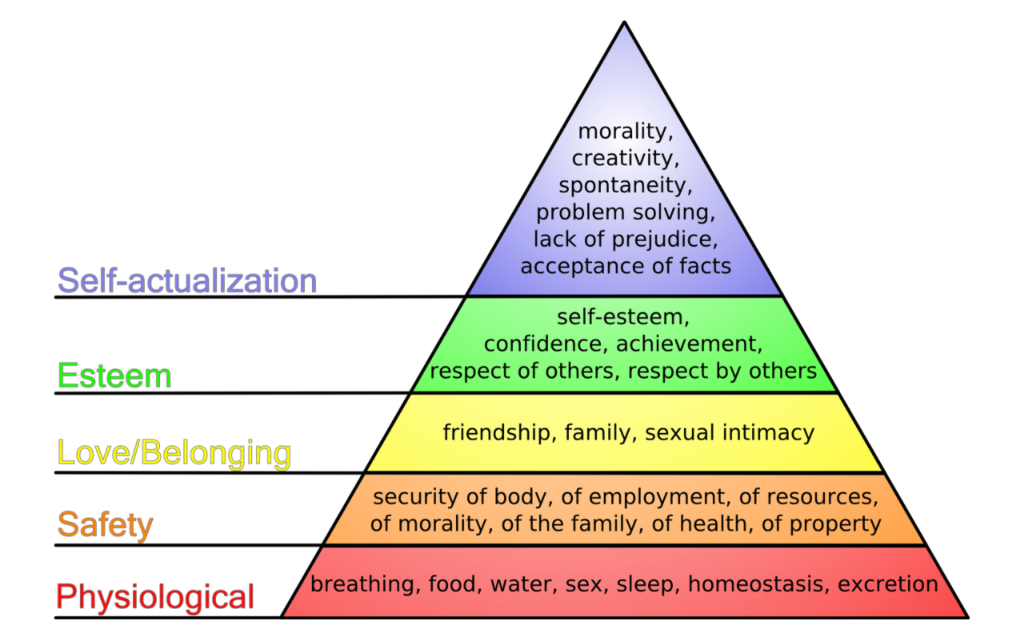How My Eating Disorder Changes Maslow’s Hierarchy of Needs
Editor's Note
If you live with an eating disorder, the following post could be potentially triggering. You can contact the Crisis Text Line by texting “NEDA” to 741741.
I hold a bachelor’s degree in psychology, I am a local public speaker, and I am an aspiring LPC and graduate student. With that in mind, please allow me to share my nerdy journey to discovering how my brain fits in with what I’ve learned in life and in the classroom.
Abraham Maslow’s Hierarchy of Needs is one of the most notable theories in the psychology world. A typical “second week of Psychology 101” topic, this famous pyramid is often thought of as common sense. While the structure of Maslow’s theory is very simple, studying it through the lens of someone with a mental illness, it became clearer to me that being mentally ill does not mean that I lack this common sense. Let me explain why I think so:
This humanistic psychology diagram is used to explain what people need to be motivated to achieve their highest self goals. It is broken down into five parts, in order: basic physiological needs, safety needs, belonging and love needs, esteem needs, and self-actualization.

Physiological needs include basic human needs of water, food, sleep, etc. Safety needs include shelter, basic resources, health needs, employment. Belonging and love needs includes friendship, family, and community. Esteem needs can include a sense of respect, self-esteem, feelings of freedom and strength. And lastly, self-actualization is essentially self-fulfillment, or reaching your full potential as your individual person.
This hierarchy is put in a pyramid to show that no step-up in the journey to self-actualization can be achieved without the previous step in your life. I have found in my own experiences with mental illness, particularly in my fight against my eating disorder, that my mind tends to make me believe I am the exception to this process. What I came to realize is that in my mind, my pyramid is flipped upside-down. (insert inverted image)
My eating disorder manifests itself in a way that leads me to believe that, somehow, I can bypass my basic human needs and psychological needs, and yet still achieve my version of self-fulfillment. When I am deep in disordered thought, I often feel that I am only “deserving” of these basic needs once I’ve “earned” them by meeting a set of standards. These standards are always unrealistic and untied to my worth as a human being.
When I first put together that my brain was distorting this picture, it shed light onto the illusion that my eating disorder is trying to sell me. As I’m in the process of recovery, I am learning that taking care of my body is something I inherently need. The act of taking care of myself is not what my self-actualization looks like; it is not what anyone’s looks like. Goals that relate to my body image are not my life’s purpose. Acting on disordered behaviors and believing self-sabotaging thoughts robs me of the emotions that make me human, and there is no way to reach who I want to be while allowing that to be my baseline. I cannot be strong enough, physically or mentally, to identify and reach for my fulfilled self without meeting my basic needs.
Many people who struggle with eating disorders, other mental illnesses and self-insecurities in general have similar feelings of needing to earn their worth. Not every psychologist uses Maslow’s hierarchy in what they practice, but it is undeniable that studying his theory has affected how I perceive my own illness.
Mental illness is not a flaw in character, nor is it a lack of common sense; I believe that this is one example of how that can be seen. I deserve to eat, and I deserve to feel secure in my body and space. Anyone and everyone who is questioning their worth is deserving of every tier in the pyramid, and deserves them in the order Maslow intended. Slowly, I am re-learning this as my truth. Recovery to me is the adventure of learning where my goals, aspirations and passions lie outside of the identity of anorexia nervosa. I cannot wait to see how much I can do for myself, and the world, when I truly let my identity be all that I really am.
For more on Maslow’s Hierarchy of Needs, check out this discussion on its relation to the Black Lives Matter movement from Mighty contributor Gabrielle Ferrara, MSW, LSW.
Lead Image via Marta Shershen/Getty Images. Maslow’s Hierarchy of Needs Image via Wikimedia Commons

